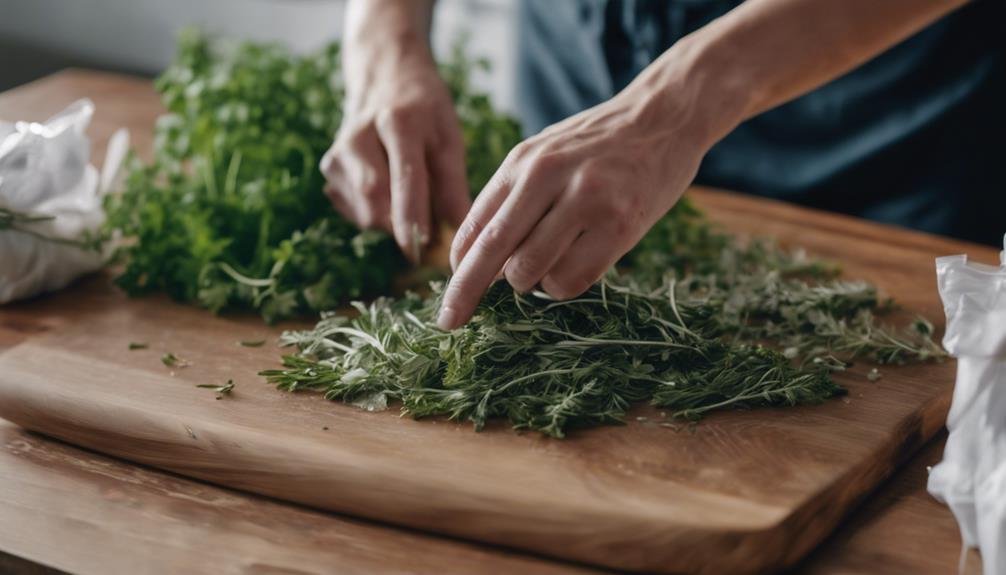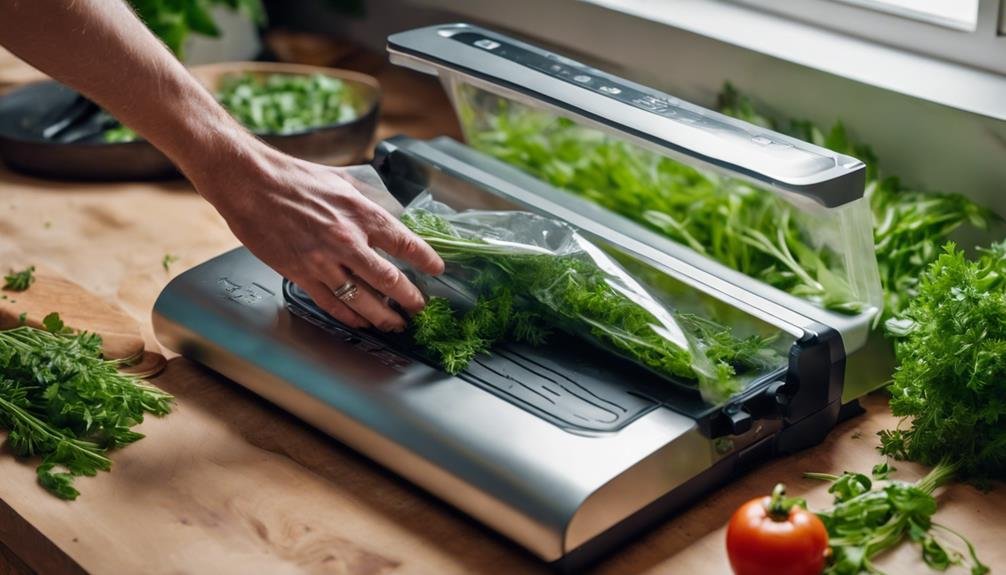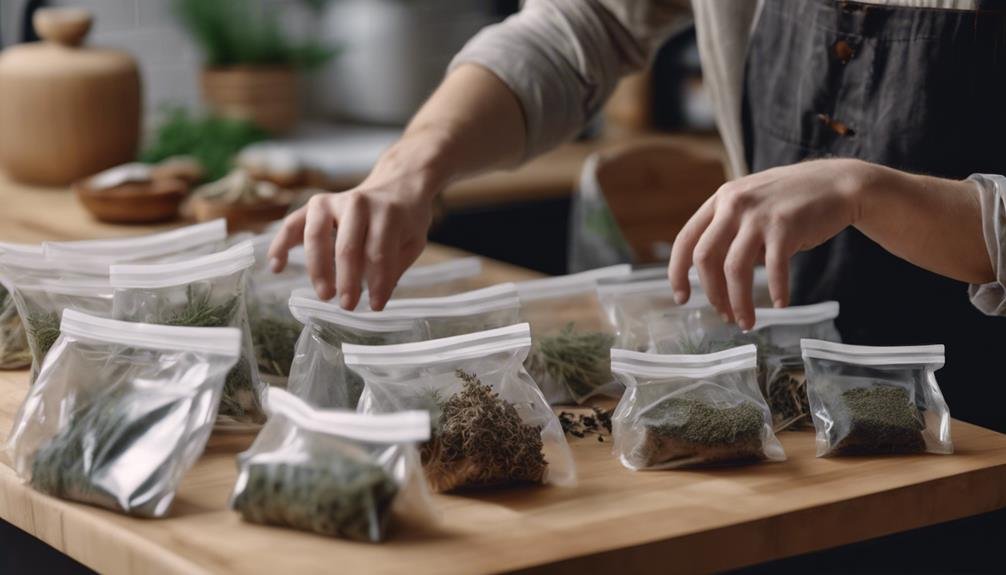Vacuum sealing fresh herbs is a great way to keep them fresh and flavorful for longer periods. To start, make sure to wash and completely dry your herbs. It's helpful to portion them into single-use sizes for convenience. For delicate herbs like basil, blanching them quickly in boiling water followed by an ice bath can help preserve their freshness. After blanching, ensure they are thoroughly dried. When vacuum sealing, use a sealer with specific settings for herbs or a pulse mode for more control. Remember to remove all air from the package before sealing. To maintain the herbs' taste and aroma, freeze them immediately after sealing. Proper storage in the refrigerator or freezer will help retain their freshness and flavor. By mastering these techniques, you can enhance your herb preservation skills and enjoy vibrant herbs whenever you need them.
Benefits of Vacuum Sealing
Vacuum sealing fresh herbs greatly extends their freshness and flavor. By utilizing a Vacuum Sealer machine, you can greatly lengthen the shelf life of your herbs, keeping them vibrant and aromatic. When you vacuum seal your herbs, you effectively slow down oxidation and degradation processes. This means your herbs stay fresh much longer than they would with traditional storage methods.
Imagine having a bunch of parsley or basil that remains as lively and flavorful as the day you bought it. By vacuum sealing fresh herbs, you can achieve just that. Sealing them properly ensures that their essential oils and flavors are preserved, ready to enhance your dishes whenever needed. It's a practical way to keep fresh herbs on hand without worrying about them wilting or losing their potency.
Additionally, by extending the shelf life of your herbs, you reduce waste and save money. No more tossing out wilted cilantro or thyme. Instead, your herbs can be stored in the refrigerator, maintaining their peak condition and making them easily accessible for cooking. A Vacuum Sealer machine is your best ally in keeping your culinary herbs fresh and flavorful for longer.
Choosing the Right Equipment
To guarantee your herbs remain fresh and flavorful, it's crucial to choose the right equipment for vacuum sealing. The first step is selecting a vacuum sealer machine that fits your needs. A FoodSaver® Vacuum Sealer is a reliable option for effectively sealing fresh herbs like basil and parsley. These machines often come with specific settings designed for delicate herbs, ensuring they don't get crushed during the sealing process.
When you're picking out your vacuum sealer, consider these key features:
- Herb-Specific Settings: Look for machines with settings tailored for delicate herbs.
- Compatible Bags and Containers: Make sure you have the right bags or containers designed for herb preservation.
- Size and Capacity: Choose a vacuum sealer that can handle the amount of herbs you plan to seal.
- Pulse Mode: This feature allows for better control, preventing the herbs from being damaged.
Preparing Herbs for Sealing

Start by washing and thoroughly drying delicate herbs like basil, chives, cilantro, dill, mint, and parsley. After washing, gently pat the herbs with a clean towel or use a salad spinner to remove excess moisture. Ensuring they are completely dry is essential, as any remaining water can lead to mold growth during storage.
Next, consider portioning the herbs into single-use quantities. This prevents the need to open and reseal vacuum-sealed bags frequently, helping maintain the herbs' freshness. For example, if you often use fresh basil in specific amounts, divide it accordingly before sealing.
While blanching herbs can help preserve their vibrant color and flavor, make sure you thoroughly dry the herbs afterward. Skipping this step can introduce unwanted moisture, which is detrimental to vacuum sealing.
For an extra touch, you might create herb-infused ice cubes. Simply place your dried herbs into ice cube trays, fill with water, and freeze. These cubes can be vacuum-sealed and stored for later use in soups or stews.
Blanching Herbs Before Sealing
Blanching your herbs before sealing helps lock in their vibrant color and fresh flavor. This quick process involves briefly immersing fresh herbs like basil, parsley, and others in boiling water, then transferring them to ice water to stop the cooking process. Blanching herbs is crucial for preserving their freshness and zip when you eventually use them in your favorite recipes.
Here's why you should consider blanching before vacuum sealing:
- Color Preservation: Blanching helps herbs retain their vibrant green color, making them look as fresh as the day you sealed them.
- Flavor Retention: The brief boiling locks in the herbs' natural oils, ensuring they maintain their aromatic qualities.
- Texture Maintenance: This process prevents the herbs from becoming mushy, keeping them crisp and flavorful.
- Mold Prevention: Making sure herbs are dry before sealing reduces the risk of mold growth, preserving quality.
To blanch basil leaves, parsley, or any other delicate herbs, simply boil them for about 15 seconds, then plunge them into ice water. Pat them dry thoroughly before vacuum sealing to avoid moisture issues. By taking this extra step, you'll guarantee that your herbs stay fresh and flavorful for much longer.
Vacuum Sealing Fresh Herbs

After blanching, vacuum sealing your fresh herbs guarantees they stay vibrant and flavorful for an extended period. This technique is particularly effective for delicate herbs like basil, chives, cilantro, dill, mint, and parsley. First, make sure your herbs are completely dry before you start the vacuum sealing process to prevent any moisture from causing mold growth.
Portioning is a smart step to make certain you only use what you need without wasting any herbs. Divide your herbs into small, single-use portions before vacuum sealing. This makes it convenient to grab just the right amount for your recipe without having to thaw a large batch.
Once portioned, place your herbs in vacuum-sealed bags. The vacuum sealing process removes air, which helps maintain the herbs' flavor and quality. After sealing, immediately freezing the herbs locks in their freshness and extends their shelf life even further.
For dried herbs, the vacuum sealing process is equally important. By sealing dried herbs, you prevent exposure to air and moisture, ensuring they remain potent and free from mold. Following these steps, your herbs will be ready to use whenever you need them, retaining their peak flavor and aroma.
Storing Vacuum-Sealed Herbs
To maximize the shelf life of your vacuum-sealed herbs, store them in the refrigerator or freezer. Vacuum sealing fresh herbs preserves their flavor and aroma, guaranteeing you can enjoy them for months. By keeping vacuum-sealed herbs in a cool environment, you prevent oxidation and maintain their quality.
Here are some key tips to follow:
- Refrigerate or freeze: Store your vacuum-sealed herbs in the refrigerator for short-term use or in the freezer if you plan to keep them longer.
- Use portioned sizes: Vacuum seal herbs in small, portioned sizes to make it easy to use just what you need without exposing the rest to air.
- Label and date: Clearly label and date each vacuum-sealed package, so you know exactly when they were sealed and can use the oldest ones first.
- Check seals: Periodically check the seals of your vacuum-sealed herbs to guarantee they're still airtight and haven't been compromised.
Storing your vacuum-sealed herbs correctly will prolong their shelf life and keep their flavor intact. By following these simple steps, you'll always have fresh herbs on hand, ready to elevate your culinary creations.
Vacuum Sealing Dried Herbs

Vacuum sealing dried herbs locks in their robust flavors and aromas, ensuring they stay potent for up to a year. When you vacuum seal herbs, you're fundamentally creating an airtight environment that prevents moisture from creeping in and ruining your carefully dried herbs. This method is especially beneficial for preserving herbs because it maintains their quality over an extended period.
First, make sure your dry herbs are completely free of moisture. Any residual moisture can spoil the herbs. Unlike fresh herbs that may require blanching herbs to preserve their color and flavor, dried herbs are ready to go as is. Place them in portioned vacuum-seal bags to make it easy to grab just what you need for cooking without having to reseal the entire stash.
Using a vacuum sealer, apply the appropriate sealing techniques to remove all the air from the bags. This step is important for maintaining the potent flavors and aromas of the herbs. By vacuum sealing herbs in portioned sizes, you'll find it convenient and cost-effective, reducing waste and saving money in the long run. Properly sealed, your dried herbs will remain as fragrant and flavorful as the day you dried them.
Tips for Longevity and Flavor
Maximize the longevity and flavor of your herbs by following these key tips. Blanching delicate herbs before you vacuum seal them helps to preserve both their flavor and freshness. This quick process stops enzyme actions that can degrade their quality over time. Ensuring your herbs are properly dried before sealing is essential to prevent mold growth. Moisture is the enemy when it comes to maintaining their longevity.
Here are some specific steps to follow:
- Blanching: Quickly blanch delicate herbs like basil and cilantro before vacuum sealing to lock in their vibrant flavor and freshness.
- Drying: Make sure herbs are thoroughly dried to avoid moisture that can lead to mold.
- Portioning: Divide herbs into single-use portions. This prevents repeated exposure to air, which can degrade their quality.
- Freezing: Immediately freeze the herbs after vacuum sealing to maintain their taste and aroma.
Vacuum sealing helps slow down the oxidation and degradation processes, giving your herbs an extended shelf life. By taking a few extra steps, you can enjoy the freshness and robust flavors of your herbs for months, making your culinary creations even more delightful.
Conclusion
By blending your knowledge of vacuum sealing with careful preparation, you'll preserve the potent flavors of your fresh herbs. From selecting superior equipment to storing sealed sachets, every step guarantees lasting longevity. Don't forget to blanch before bagging and take tips for tasty triumphs. With these techniques, your herbs will stay flavorful and fresh, ready to elevate your culinary creations. So, seal with confidence and savor the satisfaction of superior seasoning.
